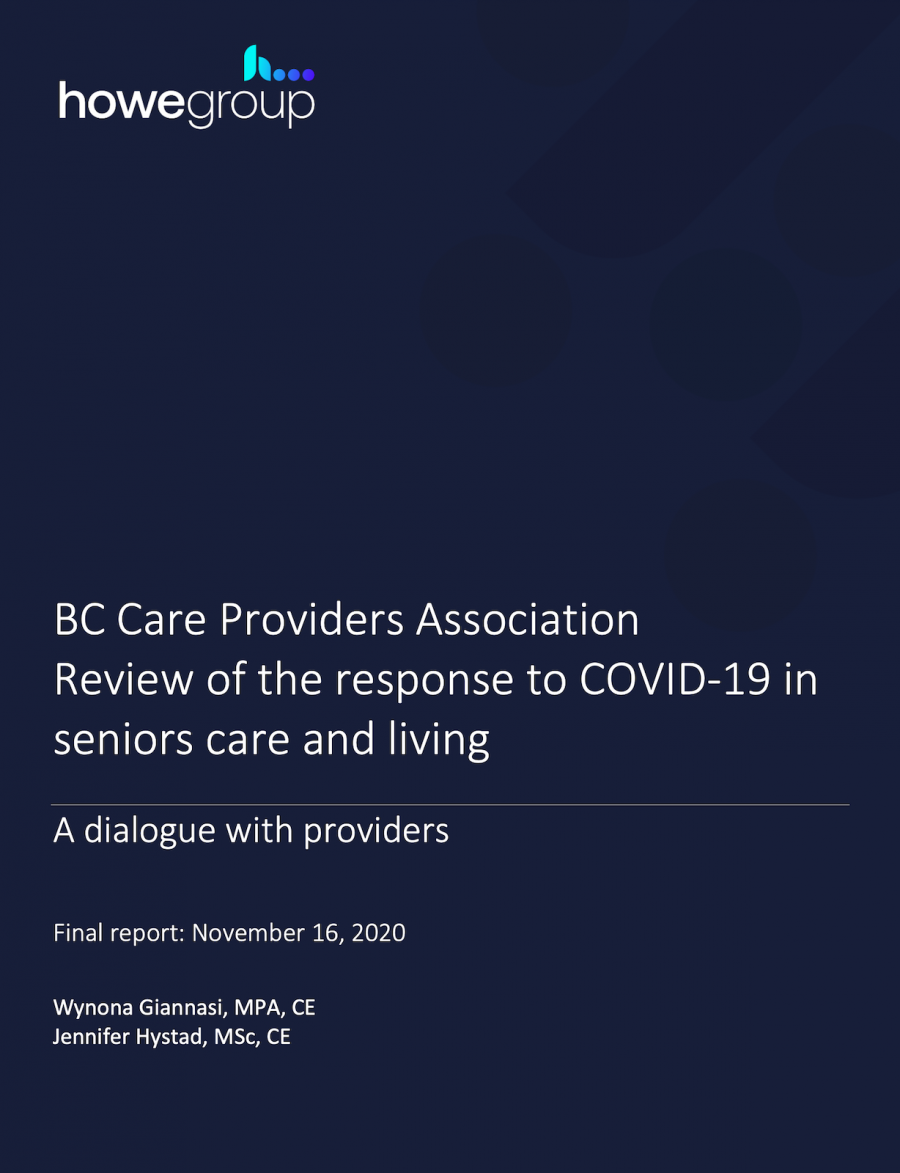FOR IMMEDIATE RELEASE
Care providers seek improved communication, testing, and access for essential caregivers
Burnaby, BC (November 19, 2020) – With a ‘second wave’ of the COVID-19 crisis once again threatening to overwhelm Canada’s long-term care and assisted living residences, an independently reviewed report on B.C.’s pandemic response released today recommends that immediate measures are taken to protect the province’s vulnerable seniors in care.

The report titled Review of The Response To COVID-19 In Seniors Care and Living was commissioned by BC Care Providers Association, the leading voice for long-term care, assisted living, independent living and home health operators in British Columbia. In advance of its final release, the document was reviewed by a six-member academic panel chaired by Dr. Carole Estabrooks (Faculty of Nursing, University of Alberta). The report follows a preliminary set of 17 next wave recommendations published by the organization in July.
“In B.C. we must do, and be seen to be doing, everything we can to support and protect our most vulnerable seniors during the global pandemic,” says BCCPA CEO Terry Lake. “Regrettably, COVID-19 has returned to our province with a vengeance during the second wave, so we are asking everyone – including family caregivers, staff on the front lines, government, public health officials, labour unions and others in the community – to embrace all the measures needed to bend the curve and stop the virus from spreading further.”
The author of BCCPA’s Review Report – health industry consultants Howegroup – conducted a major sector-wide consultation utilizing a mix of interviews, roundtables, a member survey and through online submissions. The result is a detailed look at the challenges faced by operators in long-term care, assisted and independent living, and home health, and a series of priority recommendations to help keep COVID-19 in check in order to protect residents and staff.
“Though many strong pandemic response measures by the Ministry of Health are already underway, we see many more opportunities to improve the lives of our seniors and the people who care for them,” says Lake. “Rapid testing protocols and systems are a must, as are clear guidelines on how we can keep essential family caregivers safely connected to their loved ones. Furthermore, we need to support staff through the timely dispersal of funding and pandemic pay, and by providing mental health and safety programs to alleviate widespread employee burnout.”
BCCPA’s Review Report also explains how the individual liberties of seniors and staff in long-term care and assisted living were undermined through the series of public health orders and restrictions on visitation.
“There are many lessons from our experiences during the pandemic so far,” adds Lake, “and one of them is the need to protect residents’ quality of life during this vulnerable time.”
A copy of the full report and executive summary are available for download at www.bccare.ca.
-30-
CONTACT
Mike Klassen
VP, Public Affairs
mklassen@bccare.ca
604-377-5499
Downloads: Full report – Executive Summary
Recommendations (Top 10)
- The Ministry of Health provide an overarching pandemic plan with clear lines of responsibility and for communication across the continuing care sector, inclusive of publicly subsidized and privately retained home health and independent living.
- Health authorities adopt a standardized pandemic response plan for the continuing care sector, inclusive of publicly subsidized and privately retained home health and independent living, which clearly outlines what happens in the event of an outbreak.
- Continue the single site order policy for staff in long-term care and assisted living residences.
- Create additional capacity and more suitable environments that ensure reduced transmission of infectious diseases among residents with advanced dementia and socially inappropriate behaviours.
- The Provincial Health Officer to establish rapid testing alongside screening protocols for residents and staff in long-term care, assisted living, and independent living.
- Address critical staff shortages by expanding training for new and established care staff.
- Maintain funding for wage levelling and extend to staff across the continuum of care in order to provide equitable pay for frontline staff.
- Support psychological health and safety programs for workers, residents/seniors and families.
- Ensure the timely dispersal of allocated per-bed funding advances to cover provider pandemic-related expenditures for PPE, staffing, and other requirements.
- Establish robust protocols for safe and frequent social contact between residents and family members, in collaboration with SafeCare BC. Strengthen connections between families and seniors through the use of tools and technology.
See the full report for a detailed set of recommendations.
Backgrounder: About the Report
- Survey and interviews were conducted over the month of August 2020
- The report’s findings are inclusive of long-term care, assisted living, independent living and home health
- The report’s objective was to (1) identify facilitating factors and challenges in the response to COVID-19 in seniors care and (2) give voice to the views of providers
- A mixed methods engagement strategy was utilized, inclusive of a member survey (n=72 of a possible 134 long-term care and/or assisted living providers), interviews (n=25), roundtables (n=13 independent living and n=13 home health providers) and an online member submissions portal limited to input on draft recommendations submitted to the Ministry of Health (18 written submissions received)
- Top issues for providers include:
- Staff shortages caused in part by COVID-19 and the single site order
- Limited availability of personal protective equipment
- Inconsistent and unclear communication from government agencies and the health authorities
- Restrictions that impacted the rights of residents
- Restrictions on visitation by family caregivers and loved ones
- Burdensome increases in auditing and reporting that take away from front-line care
- Extreme cost overruns caused by PPE use, enhanced cleaning, sick days and overtime
- Staff at privately operated home health providers and independent living housing did not feel valued as the temporary pandemic pay only went to employees working in organizations that were contracted by government
- Providers were split as to whether residents infected by COVID-19 should be isolated in specialized units operated by the health authorities
About BC Care Providers Association
Established in 1977, BC Care Providers Association (BCCPA) is the leading voice for B.C.’s continuing care sector. Our growing membership base includes over 400 long-term care, assisted living, home care, home support, and commercial members from across British Columbia. Through its operating arm EngAge BC, the organization represents independent living, as well as private pay assisted living, long-term care and home health services.





